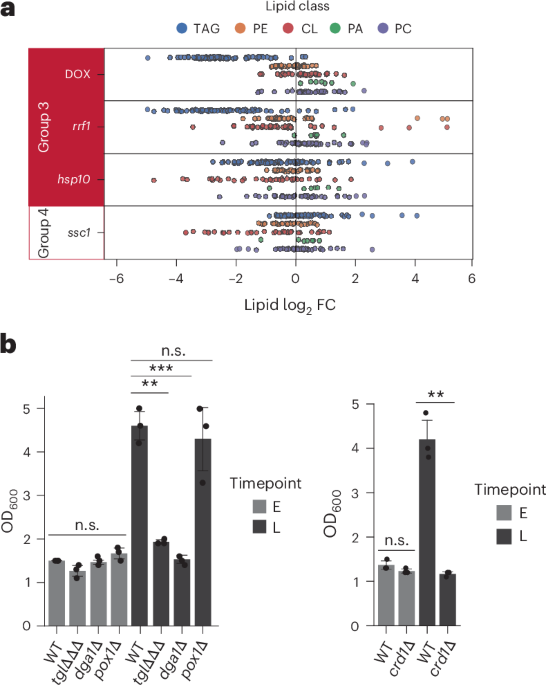
Multiomics reveals that triacylglycerol mobilization helps drive recovery from mitochondrial stress
- Select a language for the TTS:
- UK English Female
- UK English Male
- US English Female
- US English Male
- Australian Female
- Australian Male
- Language selected: (auto detect) - EN
Play all audios:

We devised a multiomics strategy to identify metabolic pathways used by yeast to surmount mitochondrial stress. Strains capable of recovery relied on triacylglycerol mobilization to provide
acyl groups for nascent cardiolipin biosynthesis during mitochondrial biogenesis. We further linked multiple proteins to this mobilization phenotype, including essential lipases in both
yeast and mammalian model systems. Access through your institution Buy or subscribe This is a preview of subscription content, access via your institution ACCESS OPTIONS Access through your
institution Access Nature and 54 other Nature Portfolio journals Get Nature+, our best-value online-access subscription $29.99 / 30 days cancel any time Learn more Subscribe to this journal
Receive 12 print issues and online access $209.00 per year only $17.42 per issue Learn more Buy this article * Purchase on SpringerLink * Instant access to full article PDF Buy now Prices
may be subject to local taxes which are calculated during checkout ADDITIONAL ACCESS OPTIONS: * Log in * Learn about institutional subscriptions * Read our FAQs * Contact customer support
REFERENCES * Schlieben, L. D. & Prokisch, H. The dimensions of primary mitochondrial disorders. _Front. Cell Dev. Biol._ 8, 600079 (2020). A REVIEW THAT DISCUSSES THE PREVALENCE OF
MITOCHONDRIAL DISEASE AND ISSUES SURROUNDING DIAGNOSTICS. Article PubMed PubMed Central Google Scholar * Mottis, A., Herzig, S. & Auwerx, J. Mitocellular communication: shaping
health and disease. _Science_ 366, 827–832 (2019). A REVIEW THAT DISCUSSES HOW MITOCHONDRIA COMMUNICATE WITH THE REST OF THE CELL TO ALLEVIATE MITOCHONDRIAL DYSFUNCTION. Article CAS PubMed
Google Scholar * Kim, H.-E. et al. Lipid biosynthesis coordinates a mitochondrial-to-cytosolic stress response. _Cell_ 166, 1539–1552.e16 (2016). THIS PAPER REPORTS THAT LIPID METABOLISM
HAS A ROLE IN MITOCHONDRIAL STRESS RESPONSES. Article CAS PubMed PubMed Central Google Scholar * Rensvold, J. W. et al. Defining mitochondrial protein functions through deep multiomic
profiling. _Nature_ 606, 382–388 (2022). THIS PAPER ILLUSTRATES HOW MULTIOMIC PROFILING CAN BE USED TO DEFINE PROTEIN FUNCTION. Article CAS PubMed PubMed Central Google Scholar * Zhu,
Y. et al. Mass spectrometry-based multi-omics integration with a single set of _C. elegans_ samples. _Anal. Chem._ 95, 10930–10938 (2023). THIS PAPER DESCRIBES OUR EXTRACTION PROTOCOL FOR
ACQUIRING MULTIOMIC DATA FROM A SINGLE SET OF SAMPLES. Article CAS PubMed PubMed Central Google Scholar Download references ADDITIONAL INFORMATION PUBLISHER’S NOTE Springer Nature
remains neutral with regard to jurisdictional claims in published maps and institutional affiliations. THIS IS A SUMMARY OF: Baker, Z. N. et al. Triacylglycerol mobilization underpins
mitochondrial stress recovery. _Nat. Cell Biol_. https://doi.org/10.1038/s41556-024-01586-6 (2025). RIGHTS AND PERMISSIONS Reprints and permissions ABOUT THIS ARTICLE CITE THIS ARTICLE
Multiomics reveals that triacylglycerol mobilization helps drive recovery from mitochondrial stress. _Nat Cell Biol_ 27, 184–185 (2025). https://doi.org/10.1038/s41556-024-01603-8 Download
citation * Published: 24 January 2025 * Issue Date: February 2025 * DOI: https://doi.org/10.1038/s41556-024-01603-8 SHARE THIS ARTICLE Anyone you share the following link with will be able
to read this content: Get shareable link Sorry, a shareable link is not currently available for this article. Copy to clipboard Provided by the Springer Nature SharedIt content-sharing
initiative
